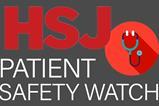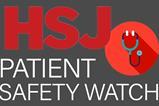HSJ is now hosting the Patient Safety Watch newsletter, written by Patient Safety Watch chief executive James Titcombe.
Good afternoon and welcome to this fortnight’s Patient Safety Watch newsletter.
Investigation uncovers string of midwives’ concerns about care quality at NHS trust
BBC Panorama has revealed midwives raised multiple concerns about the quality of maternity care provided by Gloucestershire Hospitals Foundation Trust.
In particular, colleagues were worried about the care provided at the Cheltenham Birth Centre – intended for women with low-risk pregnancies – after two babies died when their mothers’ labours ran into difficulties and they were not transferred to Gloucestershire Royal Hospital in time.
A whistleblower described how she brought her concerns about the care provided by two midwives to trust management following the babies’ deaths but was told there was not enough proof. She told the broadcaster: “I said: ‘But two babies have died. How much more proof do you actually need?’”
The trust told the BBC it was “deeply sorry… that failings in our care led to these tragic deaths”.
Peers call for ‘step change’ for maternity safety
Maternity care was discussed at an important debate in the House of Lords during which Baroness Cumberlege – arguably the most influential figure in UK maternity policy over the last three decades – backed calls for a “national inquiry” into the services.
She said: “My Better Births report was published in 2016 and had a five-year plan, but those years have now passed. I believe we need a fresh strategic national inquiry and a new coherent and practical plan for the whole maternity system. We need to tackle the issues of poor quality and poor outcomes.”
And Baroness Taylor aptly ended the debate by saying: “All women need proper care. All midwives, I would say, deserve the joy and the pleasure of seeing women cared for properly and… healthy births… I think that to achieve that, we need a step change, and I hope this debate has been one significant step forward in urging ministers to look at this problem with a new eye and new determination.”
My view? In the past, I’ve been extremely positive about the national focus on maternity safety and the evidence that, in some areas, real progress has been made. However, the signs are clear we are no longer heading in the right direction. A new national inquiry would be an opportunity to take a whole system look at where we are; to examine and better understand what changes have worked, why progress in some areas has been limited and what actions are required to set us on a better path.
A very strong and wider-ranging consensus on the need for action now seems clearer than ever – but a decisive response from ministers remains absent.
In other news this edition:
MPs to examine NHS leaders’ role in keeping patients safe
The Commons Health and Social Care Committee has announced an inquiry into NHS leadership, particularly its effect on patient safety.
The inquiry’s terms of reference include “how effectively does NHS leadership encourage a culture in which staff feel confident raising patient safety concerns, and what more could be done to support this”, “what has been the impact of the 2019 Kark Review on leadership in the NHS as it relates to patient safety”, and “how effectively does the NHS complaints system prevent patient safety incidents from escalating and what would be the impact of proposed measures to improve patient safety, such as Martha’s Rule”.
Bullying a ‘normal occurrence’ at major trust, warns CQC
The Care Quality Commission has downgraded its overall rating for Newcastle upon Tyne Hospitals FT from “outstanding” to “requires improvement”. The trust’s well-led rating also plunged to “inadequate”, with inspectors citing a “significant deterioration” in leadership.
Ann Ford, CQC’s director of operations in the north, said: “Our experience tells us that when a trust isn’t well led, this has a knock-on effect on the standard of services being provided to people…
“Some staff told us that bullying was a normal occurrence, and they were encouraged to ‘turn a blind eye’ and not report this behaviour. This is completely unacceptable and must be addressed by the leadership team as a priority to enable staff to provide the best possible experience to people.”
The trust’s newly appointed chief executive Sir Jim Mackey told HSJ a new executive team is “resetting the relationship” with staff and taking a “zero tolerance” approach to poor behaviour.
Patient safety commissioner launches new strategy
The patient safety commissioner, Henrietta Hughes, has published an updated strategy statement, focusing on three main areas:
- Driving “alignment of the healthcare system to deliver a just and learning safety culture”;
- Supporting “initiatives which amplify all patient voices and empower patients to make informed decisions about their care”; and
- Advocating “for partnerships which embed patient safety and patient voice throughout the healthcare system”.
The strategy also confirmed the PSC will “call for an overhaul of the complaints process and clinical negligence in the healthcare system… promoting restorative practice to support patients, families and healthcare workers”.
Meanwhile, in an interview with HSJ, Dr Hughes warned duty of candour was being treated as a “bit of a tick box exercise”, adding that busy NHS leaders lacked the bandwidth “to make and maintain the necessary culture change”.
She said: “What needs to change is that [NHS] trusts are currently held accountable to a very narrow set of criteria – financial and operational performance.
“When all parts of the system, including the Department of Health and Social Care and arm’s length bodies, demonstrably model listening to patients and families and incorporate this into their strategies and culture, then we will see this filter all the way down to the front line.
“This is how we will improve safety and experience, transparency, a just and learning culture, and improve morale.”
Safety watchdog highlights shortcomings in care for patients with ‘difficult airways’
A report by the Health Services Safety Investigation Body has found improvements are needed in the communication, preparation and planning of care for patients with known “difficult airways” who require interventions to help them breathe, such as intubation.
The investigation was prompted by the case of Ethan, whose Hunter Syndrome affected the anatomy of his airway. The 12-year-old was being cared for at an emergency department following a seizure, but sadly suffered a cardiac arrest and died after unsuccessful attempts to intubate.
HSSIB senior safety investigator Nichola Crust said: “Our investigation emphasises that in complex cases staff may not always have the system in place to support optimised care for advanced airway management…
“Specifically, [our investigation includes] a requirement for a robust process for documenting and sharing an individualised airway management plan for people with a complex disease to all health care professionals and services involved in their care. This will help to mitigate risks to any patient, but primarily for those who are most vulnerable when experiencing an airway emergency.”
‘National scandal’ of rapes and sexual assaults at NHS-run hospitals uncovered
A joint investigation by Sky News and The Independent has revealed almost 20,000 sexual incidents have been reported at more than 30 NHS-run mental health hospitals over the past five years, including allegations of staff assaults on patients. The figures also suggested fewer than 5 per cent of these were referred to the police.
Dame Vera Baird, the former victims’ commissioner, described the findings as a “national scandal”, while Royal College of Psychiatrists president Lade Smith said the “horrendous findings show that there is still much to do to make sure that patients and staff in mental health trusts are protected from sexual harm at all times”.
Sharing some good stuff…
Trust recognised for fall reduction initiatives
A team at University Hospitals of Derby and Burton FT’s Sir Robert Peel Community Hospital’s Andrew Ward has been praised for improving patient safety by reducing patient falls.
The team implemented learning after a patient fall, which has subsequently helped to reduce the frequency of further incidents. You can read more about this fantastic work and what was involved here.
‘Call 4 Concern’ launched at another trust
Mid Yorkshire Teaching Trust has launched Call 4 Concern – an initiative which has already been introduced at several other trusts, which enables inpatients and their friends or families to raise concerns via a dedicated phone line if they believe their, or their loved one’s, condition is deteriorating.
The move comes as the patient safety commissioner continues her work around the implementation of Martha’s Rule, with further guidance expected to be published over the next few months.
Why it made sense at the time: Local rationality questions for healthcare investigations
Louise Roe, maternity investigator for the Maternity and Newborn Safety Investigations programme (formerly part of HSIB), has published an insightful blog and tool for healthcare investigators.
She writes: “Whilst the focus of an investigation should be on systems, processes and human factors, we know that, due to the nature of the work, healthcare staff will often individualise blame on themselves when an incident occurs. Our role as the investigator is to ensure that we don’t add to this further by the way that we ask questions. Often the way that we ask a question can stay with staff long after the interview has finished.
“We have the ability, through the questions we ask, to take it away from the person and show them that it’s about the information that was available at the time, influencing human factors, and the systems, processes, and situation they were working within, that we are really interested in.”
Before signing off, a quick plug for the publication of The Times Health Commission report next week. The report is the output and recommendation from a year-long inquiry in which I have been involved as a commissioner, and is set to make important recommendations for reform of the UK healthcare system, including around patient safety. Do look out for the report.
That’s all for this edition. Please look out for our next newsletter in two weeks’ time. In the meantime, thanks for reading and please stay safe.
James Titcombe































1 Readers' comment